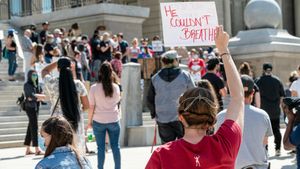PARIS - Just two months after the collapse of Michel Barnier’s cabinet, France is caught in the throes of renewed political turmoil as PM François Bayrou prepares for a no-confidence vote on Wednesday over the contentious 2025 budget. This budget, which proposes over €50 billion in cuts, is touted as the government's flagship legislation, but its passage remains uncertain as various factions within the parliament gear up for battle.
The government's future hangs precariously on the outcome of this vote, invoking memories of past political upheaval. "We must move on without delay. A country like ours cannot remain without a budget,” Bayrou asserted, speaking to La Tribune Dimanche last Sunday.
The budget is intended to trim France's budget deficit from 6% to 5.4% of GDP by the end of the year. With mounting pressure, Bayrou indicated he would invoke Article 49.3 of the French Constitution, enabling him to bypass parliamentary approval for the budget, which is generating backlash.
Political analysts note the difficulties Bayrou faces as the budget’s controversial nature could split the already fragile parliamentary makeup. Even within the left-wing factions, there's no clear consensus: the radical left party La France Insoumise (LFI), alongside the Communists and Greens, promises to table the no-confidence motion should Bayrou proceed without parliamentary consent.
The anticipated no-confidence vote showcases the deep divisions among the parties, with some factions ready to rock the boat over fears the proposed budget will usher back austerity measures. The Socialists appear particularly divided on this issue: some are determined to operate against the budget they deem harmful, meanwhile, others acknowledge the successes they've had, like protections afforded to education jobs from cuts.
Critical to this debate are Bayrou's comments about immigration, having stated there was a "feeling of flooding" of immigrants, rhetoric reminiscent of far-right discussions. This has made the Socialist Party wary; they have yet to disclose their voting strategy, stirring speculation about their eventual stance.
Across the aisle, the far-right National Rally has already declared their opposition to the budget, with party representatives such as Jean-Philippe Tanguy labeling it as "very bad" for France. Party leaders Marine Le Pen and Jordan Bardella's positions on the matter have drawn public interest, as their votes could influence the government’s fate.
The history of the recent political crisis weighs heavily on this vote. Bayrou, appointed by President Emmanuel Macron after Barnier’s government was ousted just three months prior, has struggled to secure solid backing due to the lack of parliamentary majority. This situation begs the question: Can Bayrou maintain control or will France face another politically tumultuous period?
On February 3, the executive committee of the Socialist Party had decided not to support the no-confidence motion against Bayrou, which was seen as a significant win for the Prime Minister. At this juncture, both the far-right and left have remained evasive, leaving many unanswered questions leading up to the pivotal vote.
Bayrou initially promised not to use Article 49.3 except as a last resort during total deadlock. Still, the recent parlous situation has forced his hand. The likelihood of another failed budget could inadvertently push Macron’s presidency to the brink, especially as Bayrou’s tenure has seen considerable instability since its inception.
Political observers are left pondering the consequences of this no-confidence vote: if Bayrou's government falls, what does it signal for French politics amid continued instability? The greater implication involves France's future governance structure as the president has vowed to remain in office amid changing tides.
Looking forward, the impending no-confidence vote is more than just about the numbers; it's about the political will to assert change and navigate through France's budgetary and ideological crossroads. Without solid backing, it remains unclear how Bayrou will lead the country beyond this current crisis and whether the opposition’s solidarity will hold.



